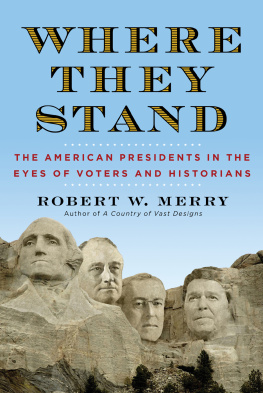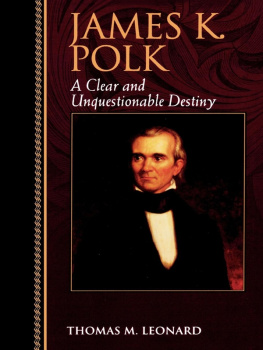
ALSO BY ROBERT W. MERRY
Sands of Empire: Missionary Zeal, American
Foreign Policy, and the Hazards of Global Ambition
Taking On the World: Joseph and Stewart Alsop
Guardians of the American Century
A Country of
Vast Designs
James K. Polk, the Mexican War, and the
Conquest of the American Continent
ROBERT W. MERRY
Simon & Schuster
NEW YORK LONDON TORONTO SYDNEY

Simon & Schuster
1230 Avenue of the Americas
New York, NY 10020
www.SimonandSchuster.com
Copyright 2009 by Robert W. Merry
All rights reserved, including the right to reproduce this book or portions thereof in any form whatsoever. For information address Simon & Schuster Subsidiary Rights Department, 1230 Avenue of the Americas, New York, NY 10020
First Simon & Schuster hardcover edition November 2009
SIMON & SCHUSTER and colophon are registered trademarks of Simon & Schuster, Inc.
For information about special discounts for bulk purchases, please contact Simon & Schuster Special Sales at 1-866-506-1949 or business@simonandschuster.com.
The Simon & Schuster Speakers Bureau can bring authors to your live event. For more information or to book an event contact the Simon & Schuster Speakers Bureau at 1-866-248-3049 or visit our website at www.simonspeakers.com .
Designed by Paul Dippolito
Map by Marilyn Gates-Davis
Manufactured in the United States of America
1 3 5 7 9 10 8 6 4 2
Library of Congress Cataloging-in-Publication Data
Merry, Robert W., date.
A country of vast designs : James K. Polk, the Mexican War, and the
conquest of the American continent / Robert Merry.
p. cm.
1. Polk, James K. (James Knox), 17951849. 2. PresidentsUnited StatesBiography. 3. United StatesPolitics and government18451849.
4. United StatesTerritorial expansionHistory19th century. I. Title.
E417.M1153 2009
973.6'1092dc22
[B] 2009024131
ISBN 978-0-7432-9743-1
ISBN 978-1-4391-6045-9 (ebook)
Insert photo credIts: The Corcoran Gallery of Art / Corbis: 1; James K. Polk Memorial Association, Columbia, Tennessee: 2, 10, 12; Jill Lang, 2009, used under license from Shutterstock.com: 3; PictureHistory: 16, 29; Library of Congress: 4, 5, 7, 9, 11, 15, 18, 19, 21, 26, 28, 30, 31; Wikimedia Commons: 6; Corbis: 8, 20; Bettmann/Corbis: 13, 24; The Ohio Historical Society: 14; The Library Company of Philadelphia: 17; iStockphoto.com/Hulton Archive: 22; Courtesy, Special Collections, The University of Texas at Arlington Library, Arlington, Texas: 23; Courtesy of the Bancroft Library, University of California, Berkeley: 25; Wikipedia: 27.
To Susie,
Who brightens my life like the dawns first
sunlight over the Cascades
Contents
A Country of
Vast Designs

INTRODUCTION: RITUAL OF DEMOCRACY
The Emergence of an Expansionist President
PRECISELY AT SUNRISE on the morning of March 4, 1845, the roar of cannon shattered the dawns early quiet of Washington, D.C.twenty-eight big guns fired in rapid succession. Thus did the American military announce to the nations capital that it was about to experience the countrys highest ritual of democracy, the inauguration of the nations executive leader and premier military commander. James Knox Polk was about to become that leader and commander. On this morning he was ensconced along with his wife, Sarah, at the National Hotel on Pennsylvania Avenue, known popularly as Colemans, just ten blocks east of the White House. That night the two of them would be residing at the presidential mansion.
At forty-nine, Polk would be the youngest of the countrys eleven presidentsand, in the view of his many detractors, the most unlikely. Until the previous May of 1844, when he had emerged unexpectedly as the Democratic Partys presidential nominee, few had imagined the man would ever rise to the presidency. Indeed, just a year earlier his political career had appeared in ruin following his third campaign for Tennessee governor. He had won the office in 1839 but had been expelled two years later by a backwoods upstart known as Lean Jimmy Jones, who had greeted his exacting rhetoric and serious demeanor with lighthearted buffoonery. Trying again in 1843 to outmaneuver this unlikely rival, he once again failed, causing friend and foe alike to dismiss his political prospects.
But those observers hadnt grasped Polks most powerful trait his absolute conviction that he was a man of destiny. Throughout his political life he had been underestimated by his rivals in the Whig Party and also by some of his own Democratic colleagues. When he had captured his partys presidential nomination, the countrys leading Whig newspaper sneered in derision. This nomination, declared the National Intelligencer, may be considered as the dying gasp, the last breath of life, of the democratic party. The newspaper said it couldnt imagine a less imposing opponent.
It was true Polk lacked the soaring attributes of the eras two rival political giants, Andrew Jackson and Henry Clay. He didnt possess Jacksons forceful presence or his blunt-spoken way of attracting men instantly to his cause and his side. Nor could he match the lanky Clays famous wit, his smooth fluency with the language, his ability to amuse and charm those around him even as he slyly dominated them. By contrast, Polk was small of stature and drab of temperament. Upon his Washington arrival for the inauguration, some of his former colleagues noted he appeared thinner than before, and one wit suggested if he hadnt had his coats cut a size or two large, he would be but the merest tangible fraction of a President.
Polk lacked the skills and traits of the natural leader. His silvery gray hair, in retreat from his forehead but abundant elsewhere, was brushed back across his head and allowed to flow luxuriantly below his collar. His probing blue eyes, deep set under dark brows, reflected a tendency toward quick and rigid judgment. Seldom did his thin lips convey any real mirth or jocularity, and the powerful jaw that jutted from his countenance signaled a narrowness of outlook tied to a persistence of resolve. Polk lacked the easy manner and demeanor that bespoke friendship and camaraderie. He didnt much like people. What he liked was politics, the art and challenge of moving events in the favored direction, which for Polk meant the direction most favored by Democrats. People thus were a means to an end, figures on a vast civic chessboard of national destiny, to be directed and positioned in such a way as to move the country where he wanted to move it. Though a man of conviction and rectitude, he often allowed himself to become encased in his own sanctimony.
These traits shrouded the real James Polk, whose analytical skills and zest for bold action often placed him in position to outmaneuver his adversaries. He understood the forces welling up within the national polity and how they could be harnessed and dominated. He was a master in the art of crafting an effective political message. And he never allowed himself to be deflected from his chosen path by the enmity of his foes or their dismissive regard toward him or their unremitting opposition.
Besides, he enjoyed the friendship and mentorship of Andrew Jackson, Old Hickory, the countrys most popular figure and its dominant political voice for the past twenty years. Jackson had been a longtime friend of the Polk family, had watched young James grow up, had counseled him on whom to marry and how to manage his career. So now on this momentous morning, as he began his day at Colemans and prepared for the events ahead, his inauguration must have seemed the most natural thing in the world even as he knew it struck most others as utterly accidental.
Next page










